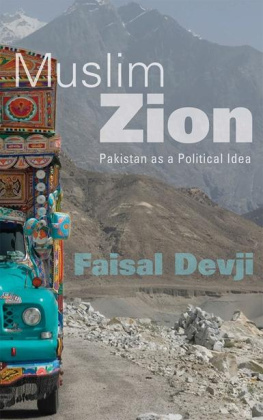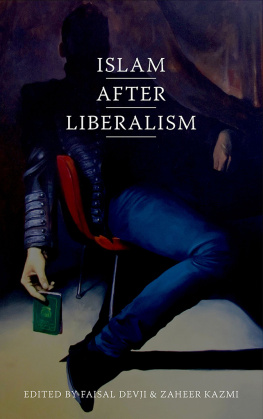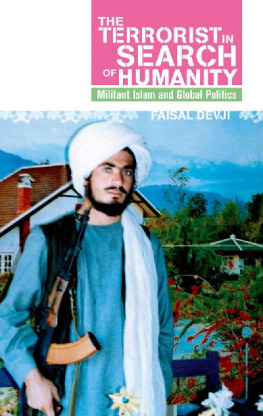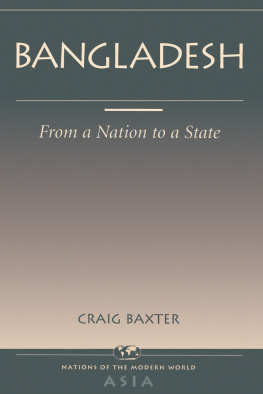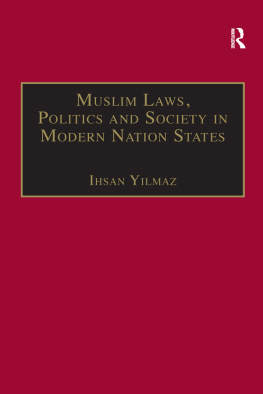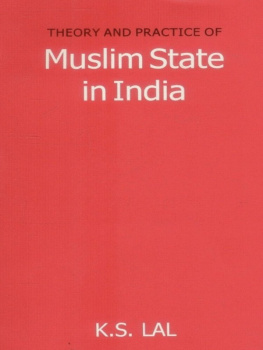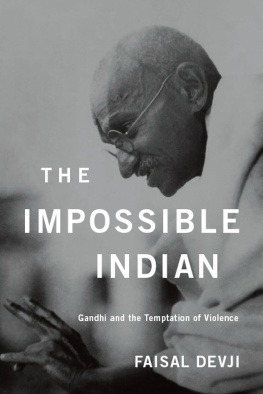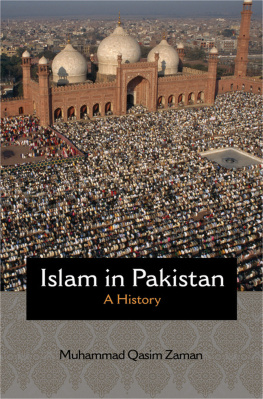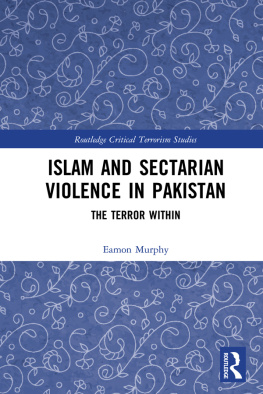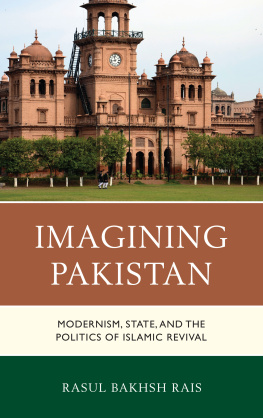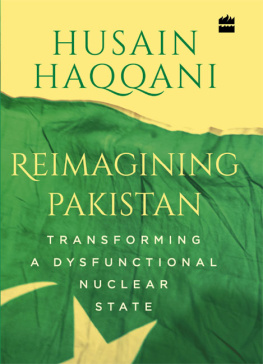Faisal Devji - Muslim Zion: Pakistan as a Political Idea
Here you can read online Faisal Devji - Muslim Zion: Pakistan as a Political Idea full text of the book (entire story) in english for free. Download pdf and epub, get meaning, cover and reviews about this ebook. year: 2013, publisher: Harvard University Press, genre: Politics. Description of the work, (preface) as well as reviews are available. Best literature library LitArk.com created for fans of good reading and offers a wide selection of genres:
Romance novel
Science fiction
Adventure
Detective
Science
History
Home and family
Prose
Art
Politics
Computer
Non-fiction
Religion
Business
Children
Humor
Choose a favorite category and find really read worthwhile books. Enjoy immersion in the world of imagination, feel the emotions of the characters or learn something new for yourself, make an fascinating discovery.
- Book:Muslim Zion: Pakistan as a Political Idea
- Author:
- Publisher:Harvard University Press
- Genre:
- Year:2013
- Rating:4 / 5
- Favourites:Add to favourites
- Your mark:
- 80
- 1
- 2
- 3
- 4
- 5
Muslim Zion: Pakistan as a Political Idea: summary, description and annotation
We offer to read an annotation, description, summary or preface (depends on what the author of the book "Muslim Zion: Pakistan as a Political Idea" wrote himself). If you haven't found the necessary information about the book — write in the comments, we will try to find it.
Muslim Zion: Pakistan as a Political Idea — read online for free the complete book (whole text) full work
Below is the text of the book, divided by pages. System saving the place of the last page read, allows you to conveniently read the book "Muslim Zion: Pakistan as a Political Idea" online for free, without having to search again every time where you left off. Put a bookmark, and you can go to the page where you finished reading at any time.
Font size:
Interval:
Bookmark:
MUSLIM ZION
Muslim Zion
Pakistan as a Political Idea
FAISAL DEVJI
Harvard University Press
Cambridge, Massachusetts
2013
Copyright Faisal Devji, 2013
All rights reserved
Jacket photo: Alex Linghorn/Getty Images
Jacket design: Jill Breitbarth
First published in the United Kingdom in 2013 by
C. Hurst & Co. (Publishers) Ltd.,
41 Great Russell Street, London, WC1B 3PL
First Harvard University Press edition, 2013
The Library of Congress has catalogued the print edition of this book as follows:
Devji, Faisal.
Muslim Zion: Pakistan as a Political Idea / Faisal Devji.
p. cm.
Includes bibliographical references and index.
ISBN 978-0-674-07267-1 (cloth : alk. paper) 1. Islam and politicsPakistan. 2. Islam and statePakistan. 3. PakistanPolitics and government20th century. 4. PakistanHistory20th century. 5. IndiaHistoryPartition, 1947. I. Title.
DS384.D43 2013
320.54095491dc23 2013014319
CONTENTS
The idea for this book was prompted by an invitation to deliver the Kingsley Martin Memorial Lecture at the University of Cambridge in 2009. The project I sketched out in my lecture was subsequently elaborated over many conversations with Shruti Kapila, as well as receiving much productive commentary in workshops and talks organized by Chris Bayly, Sunil Khilnani, Uday Mehta, Henning Trper, Ravinder Kaur and Thomas Blom Hansen. Some of the books themes possessed an earlier incarnation at Yale, as a paper on Jinnah inspired by the late Carol Breckenridge, which received the careful consideration of Arjun Appadurai, Achille Mbembe and Vyjayanthi Rao, to all of whom Im very grateful. My thanks also go to those who have generously read and commented on draft chapters. In addition to the two anonymous press reviewers, these include Derek Penslar, Neguin Yavari, C. M. Naim, Ahmed Zildzic and Kelly Grotke. As always, Rachel and Michael Dwyer as well as Christophe Carvalho have made my task as a writer easier and more pleasurable.
Faisal Devji
Oxford, March 2013
In an early essay called Is Judaea, then, the Teutons Fatherland? a great philosopher of the modern state wondered if his homeland would ever give rise to a nation. Reflecting upon the patchwork quilt of principalities that was Germany in his day, G. W. F. Hegel noted that its history seemed to provide only fragments for the building of a collective imagination:
Thus we are without any religious imagery which is homegrown or linked with our history, and we are without any political imagery whatever; all that we have is the remains of an imagery of our own, lurking amid the common people under the name of superstition. As a belief in ghosts it retains the memory of a hill where knights once did their mischief or a house where monks and nuns walked or where a supposedly faithless trustee or neighbor has still failed to find rest in the grave. As a product of fancy, drawing nothing from history, it befools weak or evil men with the possibility of witchcraft.
Instead of turning to their own country and its past, suggested Hegel, Germans were only able to imagine a homeland in the landscape of biblical Judaea, whose image they had inherited from the centuries of Christianity that preceded the politics of nationalism:
Christianity has emptied Valhalla, felled the sacred groves, extirpated the national imagery as a shameful superstition, as a devilish poison, and given us instead the imagery of a nation whose climate, laws, culture, and interests are strange to us and whose history has no connec
Hegels despair about Germanys future as a nation state was shared by so many of his compatriots as to become a historical clich. And this sentiment may well have played a part in the extraordinarily violent way by which some Germans sought to create a nation where there seemed to be none, including the attempt to make of it a world-historical power in two world wars. After many vicissitudes, Germany has finally achieved the status of a unified nation state, one founded upon the powerful myth of common blood and a rootedness in the soil of a historical fatherland. But what interests me here is Hegels suggestion that his compatriots in the early nineteenth century could only recognize their homeland in the landscape of Palestine. I want to argue that this ambiguously religious way of imagining nationality in an alien geography, without a necessary reference to shared blood and a rootedness in the soil, represents a tradition of collective belonging that differs from the conventional narratives of European nationalism.
In Hegels day such a vicarious cartography of national belonging characterized utopian communities and settler societies in the New World, some of whose political vocabularies also alluded to the Holy Land, and in particular the Children of Israels millennial return to it, whether in the journey of Moses out of Egypt or in that of the Jews final ingathering before the coming of the Messiah. The biblical elements of this political vocabulary, however, did not descend in a single file from ancient times, but were characteristic of Protestant thinking in particular.was to scripture, the primitive church or indeed Judaea. And in this sense Zionism, too, can in one of its dimensions be seen as a Protestant enterprise, dedicated as it was to the literal accomplishment of a biblical prophecy, even and especially when those who sought this fulfilment were themselves not believers of any traditional kind. But it is also clear that such a return neednt be religious at all, to say nothing of Protestant, nor need it be directed towards Palestine, for its desired homeland could just as well be thought of as another Athens, a new Rome or a Workers and Peasants Republic.
In the way I am using it in this book, then, Zion serves to name a political form in which nationality is defined by the rejection of an old land for a new, thus attenuating the historical role that blood and soil play in the language of Old World nationalism. Moreover I wish to claim that the Zionist movement leading to the creation of Israel in 1948 was simply one example of this political form, with Muslim nationalism, resulting in the founding of Pakistan a year earlier, constituting both its precedent, and perhaps its closest political relation as well. I shall return to the relationship of Pakistan and Israel in the chapter that follows, but for the time being I wish to stress that they both emerged from situations in which minority populations dispersed across vast subcontinents sought to escape the majorities whose persecution they rightly or wrongly feared. For it was only the emergence of national majorities in nineteenth-century Europe and India that turned Jews and Muslims there into minorities, whose apparently irreducible particularity posed a problem or question for states newly founded on notions of shared blood and the ancestral ownership of a homeland.
As a result of representing a problem or question for the national movements within which they were formed, both Zionism and Muslim nationalism held such forms of collective belonging to be deeply suspect, even as they sometimes attempted to fashion similar nationalities for themselves elsewhere. Or as
Marked as they are by the paradox of rejecting nationalism while desiring it at the same time, neither Zionism in Europe nor Muslim nationalism in India has ever managed to escape the naked abstraction of a homeland lacking historical roots, with Israel, for example, often seen as returning to a history made by nation-states only at the cost of denying a Jewish past in the diaspora.made it clear in this interview that by excluding other forms of collective belonging, such as blood and soil, it came to be the solitary basis for nationality, yet one whose power was for this very reason remarkably vulnerable. For we shall see that religion was itself little more than an idea for Muslim nationalism in India, one that no longer referred to any life-world of belief and practice. So however peremptory the claims of Islam might be upon its followers, no other country has made of religion the sole basis of Muslim nationality. When on the rare occasion Pakistans ideologists attempted to give it a basis in blood and soil, they could only do so by turning to their future homelands religious minorities, as in the following passages from a text published by the Muslim League in 1943, which describes that part of India watered by the Indus River and its tributaries as Pakistans natural homeland:
Next pageFont size:
Interval:
Bookmark:
Similar books «Muslim Zion: Pakistan as a Political Idea»
Look at similar books to Muslim Zion: Pakistan as a Political Idea. We have selected literature similar in name and meaning in the hope of providing readers with more options to find new, interesting, not yet read works.
Discussion, reviews of the book Muslim Zion: Pakistan as a Political Idea and just readers' own opinions. Leave your comments, write what you think about the work, its meaning or the main characters. Specify what exactly you liked and what you didn't like, and why you think so.

